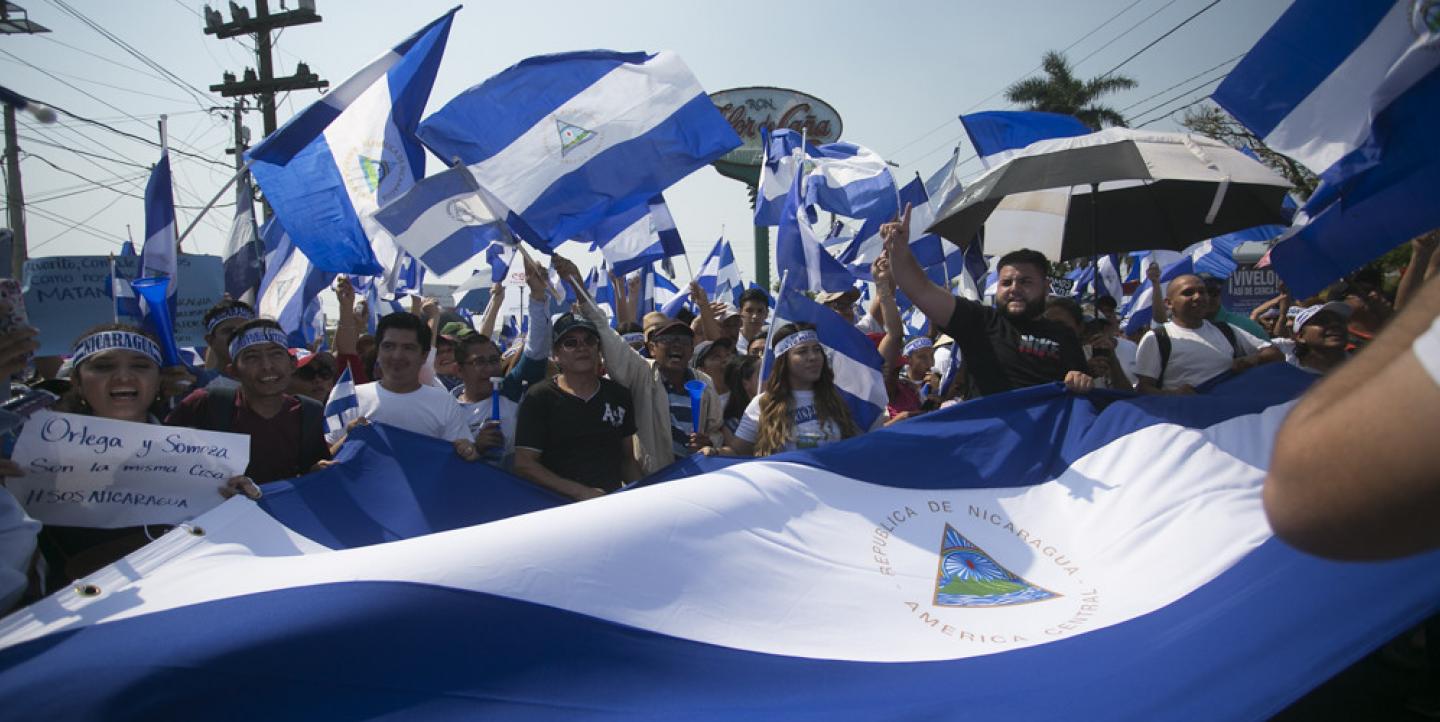In Nicaragua, where President Daniel Ortega’s administration controls all three branches of government, the press is the last remaining bastion of independence. Since last October, independent media, too, has come under increasing attack as the Ortega regime has weaponized a new cybercrime law to silence journalists in the country.
“Whoever uses information and communications technology to publish or disseminate false and/or distorted information, which causes the population or a group or sector of it to be alarmed, fearful or anxious, will have a penalty of two to four years in prison imposed, as well as 300 to 500 days of fines,” begins Article 30 of the new legislation. To date, the attorney general's office has used the law to bring more than 30 journalists to court.
One recent case is that of journalist María Lilly Delgado, a correspondent for Univisión News who in the past has taught workshops on journalism ethics and mobile journalism for the Violeta Barrios de Chamorro Foundation. The attorney general's office summoned Delgado to appear in court as part of an investigation it is conducting against the Foundation for alleged money laundering, a thesis the United States Agency for International Development (USAID) has denied.
About two weeks before being called to court, Delgado had published a report titled “Huellas de impunidad” (or “The Tracks of Impunity” in English), which highlighted a series of human rights violations and press freedom abuses in Nicaragua.
He recibido hoy dos notificaciones de la Fiscalía, la primera a las 11:20 a.m. para comparecer el "Martes, 28 de mayo", y recientemente a las 7:45 PM, recibí una segunda notificación para comparecer el "Viernes 28 de mayo" a las 11 a.m. El motivo d la citación: Entrevista. pic.twitter.com/V0Me5FKuhe
— María Lilly Delgado (@MLillyDelgado) May 27, 2021
[Read more: Reporting the crisis in Myanmar: Lessons from the ground]
Initially called as a witness, Delgado is now being investigated herself. The Nicaraguan prosecutor’s office alleges that there could be a link between her and the Chamorro Foundation’s mismanaged funds, despite the fact that Delgado is not an employee there.
IJNet reached out to Delgado, who declined to give a statement based on the recommendation of her lawyer, and because there is currently an open case against her. She does, however, lament that the Nicaraguan government has imposed travel restrictions on her. "It is arbitrary to impose a travel restriction on me. I have said ad nauseam that I am innocent. The only thing I have done is train journalists, and that is not a crime,” Delgado told fellow reporter Wilfredo Miranda, a correspondent for El País América. “I am a journalist and have risked my life to report. Now, I am risking my freedom. I am here in Nicaragua and they are not going to silence me."
La corresponsal de @UniNoticias, @MLillyDelgado reacciona al comunicado emitido ayer por la dictadura Ortega-Murillo a través del cual la criminaliza pic.twitter.com/FqGo7QOe3W
— Wilfredo Miranda Aburto (@PiruloAr) June 2, 2021
Miranda was among the journalists and directors of news organizations summoned to appear in court to account for their sources and published reporting as part of the investigation into the Chamorro Foundation. Upon leaving the courtroom, he spoke to the news outlet Confidencial. “[The interrogator] started by asking about my relationship to the Chamorro Foundation. I explained about the journalism awards I had received and some specific consulting work I had done. For all of this, I can provide supporting materials,” Miranda told Confidencial. “But I was surprised that the interrogator then called a recess, returned with a cell phone, and began to read all of my articles, [trying to] incriminate me, saying that I was lying and that I was violating the cybercrime law.”
[Read more: Attacks on Maria Ressa and Rappler are an omen for global press freedom]
Journalist Eduardo Enríquez, former editor-in-chief of La Prensa, was also summoned due to his role as supervisor for collaborative reporting projects with the Chamorro Foundation. Like Miranda, Enríquez declined to comment until the legal case comes to a conclusion.
Since May 28, 2020, the Ortega regime has arrested 19 opponents of the administration. Among them are five presidential candidates, including Cristiana Chamorro, a journalist and the daughter of former Nicaraguan president Violeta Barrios de Chamorro. Sports reporter Miguel Mendoza, who criticized the Ortega regime on his Twitter account, was also arrested.
Recently, actions taken against journalists have intensified, including a raid carried out on the home of Carlos Fernando Chamorro, the director of Confidencial and one of Nicaragua’s most well-known journalists.
Human rights organizations such as the Nicaragua Nunca + collective have demanded the release of political prisoners and condemned the limits placed on press freedom. "For more than 38 months, Nicaragua has been undergoing systematic and violent persecution, including serious human rights violations and crimes against humanity," said Gonzalo Carrión, a representative of the Nicaragua Nunca + collective.
Carrión alleged that sham, unconstitutional cases are being fabricated against journalists. "The prosecutor's office has not brought forward any charges for crimes against the people, but it has made time to criminalize journalism," he said.
Luis Fernando Cascante is a journalist in Costa Rica. This article was originally published by IJNet in Spanish. It was translated to English by journalist Natalie Van Hoozer.
Main image CC-licensed by Flickr via Jorge Mejía Peralta: A 2018 protest against repression from the Ortega regime.

